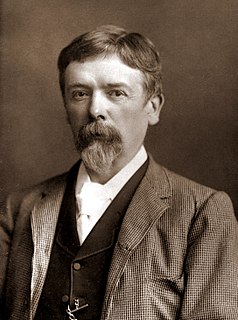A Quote by George du Maurier
Sick I am of idle words, past all reconciling, Words that weary and perplex and pander and conceal, Wake the sounds that cannot lie, for all their sweet beguiling; The language one need fathom not, but only hear and feel.
Related Quotes
I sometimes hold it half a sin To put in words the grief I feel For words, like nature, half reveal And half conceal the soul within. But, for the unquiet heart and brain A use measured language lie's The sad mechanic exercise Like dull narcotic's, numbing pain In words, like weeds, I'll wrap me o'er Like coarsest clothes against the cold But large grief which these enfold Is given in outline and no more.
All my life I've felt on the outside wherever I am - out of the picture, the conversation, at a distance, as though I were the only one able to hear the sounds or words that other's can't, and deaf to the words that they hear. As if I'm outside the frame, on the other side of a huge, invisible window.
We need to send our words out in the direction we want them to go. In other words, we need to start talking victory when we’re staring at defeat. We need to start talking healing when we’re feeling sick. We need to start blessing and prosperity when we don’t have anything. We need to speak about marching when we feel like quitting.
The being level speaks the language of art, music, color shape and pattern directly -- a language that requires no words -- is not limited by words -- nor does it have the specificity of words and thus cannot be broken onto parts that can be manipulated or analyzed by the intellect. It must be swallowed, whole not parsed, sorted and justified.
Sound words can't be understood through formal study of the language alone. They're felt when you immerse yourself in the culture or lifestyle that becomes a part of you. The Japanese language is abundant with onomatopoeia. Even though I've lived in Japan a long time, sound words are still an uncertain territory. And I think new words are being created every day. Even when I don't know a word I can sometimes connect it to a meaning using the sensations produced by the sounds, which feels like I'm playing with words.
My wife loves written words ... you know, words that stick to parchment and paper like dead flies, and it seems my father felt the same - but I want to hear words! Remember that when you are looking for the right words: You must ask yourself what they SOUND like! Glowing with passion, dark with sorrow, sweet with love, that's what I want. - Cosimo
Thus the feeling I sometimes have - which all of us who work closely with aphasiacs have - that one cannot lie to an aphasiac. He cannot grasp your words, and cannot be deceived by them; but what he grasps he grasps with infallible precision, namely the expression that goes with the words, the total, spontaneous, involuntary expressiveness which can never be simulated or faked, as words alone can, too easily.
Kids use words in ways that release hidden meanings, revel the history buried in sounds. They haven't forgotten that words can be more than signs, that words have magic, the power to be things, to point to themselves and materialize. With their back-formations, archaisms, their tendency to play the music in words--rhythm, rhyme, alliteration, repetition--children peel the skin from language. Words become incantatory. Open Sesame. Abracadabra. Perhaps a child will remember the word and will bring the walls tumbling down.
To be functionally fluent in a language, for instance, in most cases you need about 1,200 words. To acquire a total of vocabulary words, if you really train someone well they can acquire 200 to 300 words a day, which means that in a week they can acquire the vocabulary necessary to speak a language.
Little Words When you are gone, there is nor bloom nor leaf, Nor singing sea at night, nor silver birds; And I can only stare, and shape my grief In little words. I cannot conjure loveliness, to drown The bitter woe that racks my cords apart. The weary pen that sets my sorrow down Feeds at my heart. There is no mercy in the shifting year, No beauty wraps me tenderly about. I turn to little words- so you, my dear, Can spell them out.



































